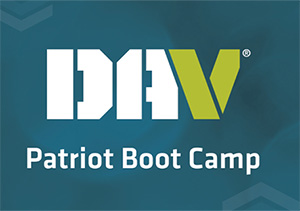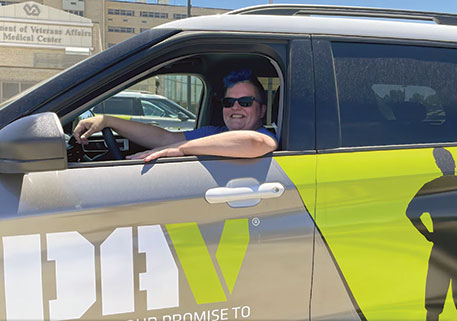 Natural disasters. Health care inequity. Disability accessibility. These are the types of universal issues being tackled by veterans who come through DAV Patriot Boot Camp, an entrepreneurship program for the military and veteran community.
Natural disasters. Health care inequity. Disability accessibility. These are the types of universal issues being tackled by veterans who come through DAV Patriot Boot Camp, an entrepreneurship program for the military and veteran community.
Founded in 2012 and acquired by DAV in 2022, Patriot Boot Camp connects transitioning service members, veterans and military spouses with invaluable education, world-class mentorship and a supportive community to help them succeed as founders.
“DAV’s core mission is to empower veterans to lead meaningful lives with purpose and dignity, and entrepreneurship is a perfect outlet to do just that,” said DAV Patriot Boot Camp Director Nick Brophy. “Supporting veterans as entrepreneurs also benefits entire communities. Their ventures are often solutions-focused and mission-driven, and that’s a recipe for big impact.”
DAV sat down with three Patriot Boot Camp alumni to learn how they’re taking on some of today’s biggest challenges. Some answers have been edited for length and clarity.


Army veteran and former combat medic Julie Sargent is the co-founder and CEO of Cardinal Medical Solutions, a company that provides on-site medical care for first responders and support personnel during wildland fires and other disaster incidents across the country.
What problem does Cardinal Medical Solutions help solve?
One of the big goals that we have is keeping our firefighters in the fight, keeping our support personnel out here on the incident. And so anytime that somebody gets hurt, or something happens, if we’re not here to respond or there isn’t that capability on the site, then not only does the patient have to now be transported out, but oftentimes two to three additional resources go with the patient and coordinate now have to be removed from the incident, which then affects the actual ability of that team to continue to operate.
And so, by us being on-site and managing that care and keeping it all in house, it allows the firefighters to stay in the fight, and it allows the rest of the personnel to stay on the incident and continue working and doing the job they’re deployed to do.
How did military service prepare you to succeed?
The incident management team style in disaster response and how they do things is very similar to military operations. And so, I think that in itself made the transition very easy for me.
Also, having that prior knowledge and experience working in remote and austere environments and learning to be creative with the level of care that you can provide, but also with the resources and knowing that you don’t always have resources immediately accessible have helped. And there’s a lot of knowledge and experience that I gained from the Army side of doing things to then be able to apply out here working in the field.
How did DAV Patriot Boot Camp help you?
I was given some interesting perspectives on how to approach some of the government contracting and also kind of what that looks like, as far as getting into that particular field, because that’s a lot of what we do; we work directly with the Forest Service and other government agencies in order to provide them support.
And I just really appreciated having that mentorship and guidance to get us where we needed to be.
Learn more at cardinalmedsolutions.com.


Yusuf Henriques, an Army veteran and former combat medic, is the founder and CEO of IndyGeneUS AI, a genomics company on a mission to improve health equity by increasing representation of women and racial minorities in clinical trials.
What problem does IndyGeneUS help solve?
Over the last 50, 60 years, pretty much every medication that’s in your cabinet has been approved using 95% European white males in clinical trials.
So, if you use COVID vaccines as an example: Typically, in an FDA trial, that would require about 20- to 30,000 patients for a Phase 3 trial that represents the demographic the vaccine is serving. But if you have 90–95% European white males in that Phase 3 trial, you have a vaccine that was predominantly developed only for one population. And so, you can see how detrimental that could be. And you started seeing a little bit of it with one particular vaccine where women were developing blood clots. That’s how big of a problem it is.
So IndyGeneUS AI is looking to increase diversity in clinical trials but also drive better drug development for all.
How did military service prepare you to succeed?
As a combat medic, I had to lead from the front. Most of the times I’m the only one with the medical training amongst a group of elite soldiers, so I’m heavily relied on when it comes to medical. And so, having the discernment, making quick judgments in life and death situations, has really formed the way I look at the world and look at solving problems, which has been very advantageous as an entrepreneur.
How did DAV Patriot Boot Camp help you?
The big topic for me, and I was not even thinking about it, was mergers and acquisitions. As a startup, you don’t really even think about that yet, but DAV Patriot Boot Camp brought in some key individuals that were like, “You need to be thinking about this now because it could happen quickly.”
Right after we had that seminar, I was approached about a merger and acquisition, and they actually helped me. I was able to follow up with the gentleman that spoke on that panel. And we ended up walking away from the opportunity because I had the counsel and advice of seasoned people in mergers and acquisitions.
Learn more at indygeneus.ai.


Illinois Army National Guard veteran and former tank mechanic Zuby Onwuta is the inventor of Think and Zoom, a patented, hands-free solution that uses a person’s brainwaves to allow individuals with blindness or low vision to zoom in or turn text to audio.
What problem does Think and Zoom help solve?
My goal was to be a medical doctor. I came to America with just $200 in a duffel bag, but I was stubborn. And I did start pre-med, and I did join the military. But within less than two years of serving, I became legally blind from Stargardt, [a rare genetic eye disease]. So, of course, that got me an exit from the military, and I had to abandon my medical studies.
And then came to find out that I’m not alone. There are approximately 300 million of us around the world who are partially sighted or blind. So, it’s not just for me to solve my own personal problem that has been driving me, but to share the solution with 300 million people all around the world who deal with a 90% illiteracy rate and a 70% average unemployment rate.
If we remove those barriers, those challenges, folks become meaningful contributors to society.
How did military service prepare you to succeed?
When you talk about discipline, when you talk about commitment, resilience—these are things that are ingrained in you if you ever put on the uniform. When it comes to entrepreneurship, any entrepreneur will tell you that they have to rely on those things to get through. There are always bumps on the road, you never know what’s around the corner. And so, I believe that veterans have already been trained in those hard things, those attributes that can help them get through as entrepreneurs.
How did DAV Patriot Boot Camp help you?
DAV Patriot Boot Camp was a great opportunity to connect with veteran entrepreneurs, and some of them are lifelong connections of mine. But it was also an opportunity to keep deepening my entrepreneurial skills.
I learned so much about the inner workings of how patents are reviewed and how long it typically takes and how to contact the reviewers and how to engage them. These were things I never knew before. And being that I was working in a space that was mostly technology, that information was really very valuable to me at that time.
Learn more at thinkandzoom.com.
Applications for the next DAV Patriot Boot Camp can be found at patriotbootcamp.org. Participants will get the chance to compete in a pitch contest with up to $15,000 in no-obligation funding up for grabs.





